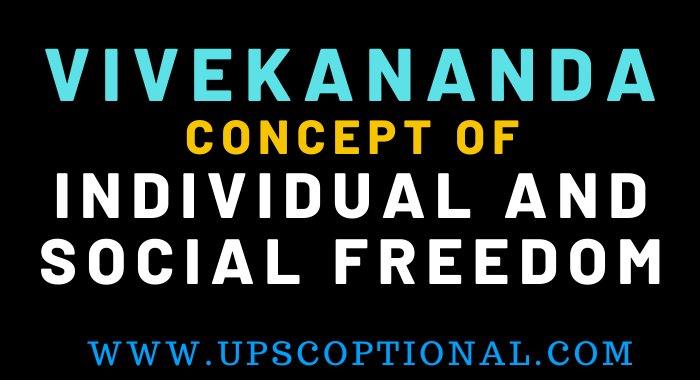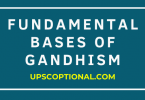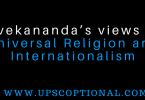Explain Vivekananda’s concept of Individual and Social Freedom.
Ans – According to Vivekananda, freedom is the keystone of spiritual life. Religion consists solely in inner spiritual urges. Wherever religion is estranged or cut off from its vital spring, spiritualism, it is degenerate into dry formalism or dull mechanised drilling a routine affair or life. True or dynamic religion life us our of our ruts.
It is also, “the function of philosophy to provide us with a spiritual rallying centre, a synoptic vision, as Plato loved to call it, Samanavaya as the Hindu thinkers put it, a philosophy which will serve as a spiritual concordant, which will free the spirit of religion from disintegration of doubt and make the warfare of creeds and sects a thing of the past.
Vivekananda declared in the Parliament of Religions with all the emphasis that he would command, “ The Christian is not to become a Hindu or a Buddhist to become a Christian. But each must assimilate the spirit of the others and yet preserve his individuality and grow according to the law of growth, If the Parliament of Religions has shown anything to the world, it is this – help and not fight’ assimilation, and not destruction, harmony and peace and not dissension.”
Vivekananda considered freedom not only for maintaining religious harmony among various religious faiths and for realising the spiritual life by the individual, but he also thought that the individual freedom was equally indispensable for realisation of his personality in the social and economic spheres.
He therefore, wanted to make freedom as the natural possession of all individuals. He inspired that every individual must cultivate a free body, mind and spirit.
He defined his concept of individual freedom as follows: Liberty does not certainly mean the absence of obstacles in the path of misappropriation of wealth etc, by you and me, but it is our natural right to be allowed to use our own body, intelligence or wealth according to our will, without doing any harm to others.”
He further explained his attitude towards freedom. ‘ Freedom is the watchword. Be free! A free body, a free mind, and a free soul! That is what I have felt all my life: I would rather be doing freely than be doing good under bondage.”
Vivekananda maintained that the individual perfects himself by acting freely and the perfect individual in turn, perfects society. The strength and vitality of the society depends on individual initiative and freedom. It is only when individual growth is obstructed, that social assistance to the individual is justified. The individual is to be assured and not lorded over in his quest for freedom.
According to Vivekananda, society was only a social agency and it should not encroach on individual freedom. His belief in freedom led him to advocate for the rights to individuals in society. Liberty becomes meaningless without equality of rights. His faith in the inherent individual freedom is the basis of his defence of equal rights and opportunities for all individuals to manifest their growth.
Vivekananda’s recognition of the natural rights of an individual, in fact puts an end to all kinds of privileges in society and establishes the right to individual equality. He condemned the privileges as baneful and tyrannical.
Thus, he advocated for social equality, and in this aspect he was much impressed by the western society.
Vivekananda’s concept of freedom was primarily spiritual, he did not ignore the social and material sides of it. To the worldly man, material life is as real as the social life. To deny material life to him is to condemn him to death. It is only when man is exhausted with pleasures of life, that he correctly know the futility of the evanescent material life and will be in search of spiritual freedom. It is all inclusive. It stands for synthesis of the individual and social freedom, material and spiritual freedom.
Blending of the East and the West – Vivekananda advised both the Indians and the Westerners. He advised Indians to learn from the West the great ideals of social service, hard labour and economic organization, while to its Western friends was to follow the spiritual truths of India, contained in Vedanta.






